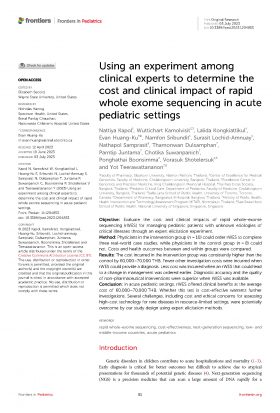This website uses cookies so that we can provide you with the best user experience possible. Cookie information is stored in your browser and performs functions such as recognising you when you return to our website and helping our team to understand which sections of the website you find most interesting and useful.
Using an experiment among clinical experts to determine the cost and clinical impact of rapid whole exome sequencing in acute pediatric settings

รายละเอียดเพิ่มเติม
Introduction
Genetic disorders in children contribute to acute hospitalizations and mortality. Early diagnosis is critical for better outcomes but difficult to achieve due to atypical presentations for thousands of potential genetic diseases. Next-generation sequencing (NGS) is a precision medicine that can scan a large amount of DNA rapidly for a diagnosis, which has demonstrated reduced morbidity, mortality, length of stay, and unnecessary procedures in hospitalized children. Unlike traditional genetic sequencing, NGS is more advantageous due to its shorter turnaround time, which is critical in acute settings. In certain instances, an earlier diagnosis also helps to make palliative care decisions. In a Thai study, rapid whole exome sequencing (rWES), a type of NGS, led to a diagnosis in 46% of patients with unknown etiologies of critical illnesses, which resulted in a change in clinical management and improved outcomes. While NGS may have tremendous benefits and is becoming increasingly available in higher-income countries due to declined costs, it has not yet gained wide-scale implementation in lower-income countries. To our knowledge, there are only a couple of economic studies on NGS in Thailand and none about using rWES in pediatric patients with unknown etiologies of critical illnesses. Therefore, this study aims to generate cost data and assess clinical outcomes of pediatric patients with unknown etiologies of critical illnesses when rWES is available to Thai physicians.
Collecting clinical trial data on pediatric patients with unknown etiologies of critical illnesses for an economic study is challenging – getting an adequate sample size is near impossible for this rare condition, and withholding a potentially life-saving intervention is highly unethical. As such, the research team employed an expert elicitation design to acquire the necessary data bypassing the aforementioned challenges. With the results of this study, the research team aims to conduct a follow-up cost-effectiveness study to inform population health decisions, including reimbursing rWES in Thailand’s universal health benefits package.
See more profound findings: https://www.frontiersin.org/articles/10.3389/fped.2023.1204853/full




